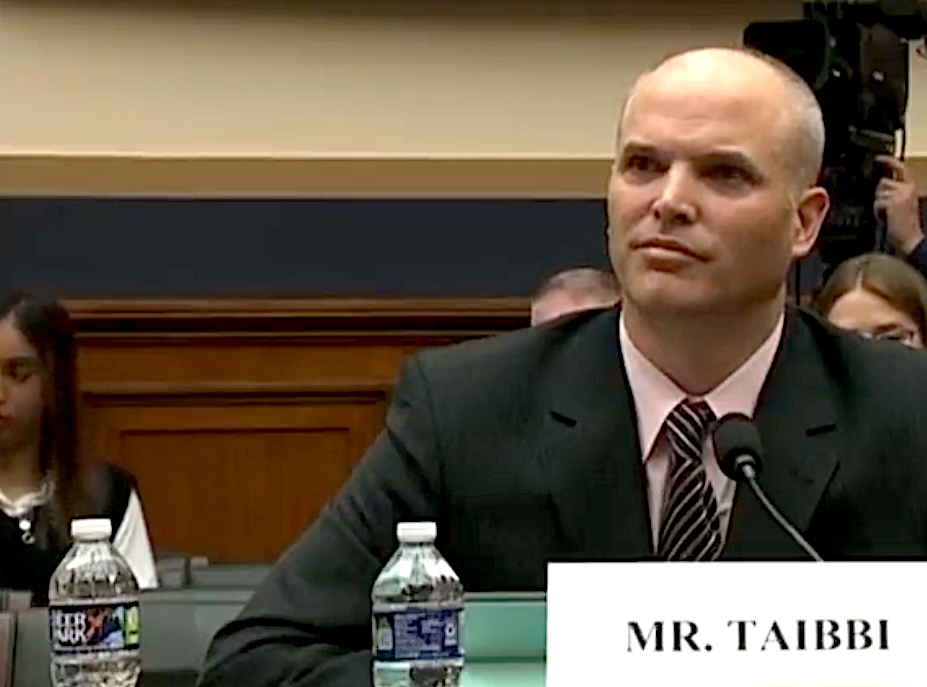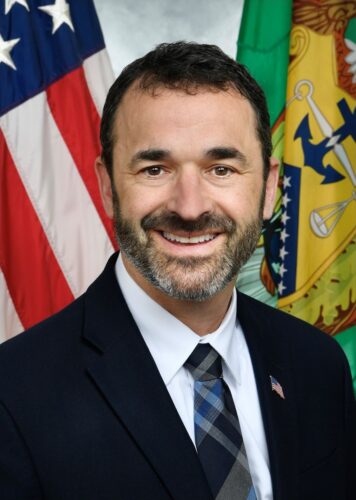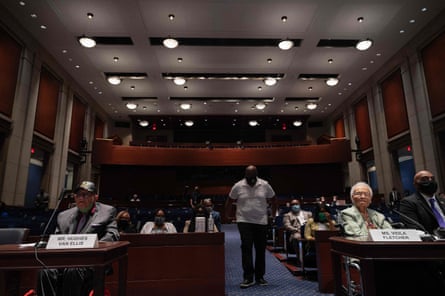Extensive government blacklists, revealed by the Twitter Files, are used to censor left-wing and right-wing critics. This censorship apparatus has been turned on the reporter who exposed them.

Redacted – by Mr. Fish.
By Chris Hedges
ScheerPost

Rep. Debbie Wasserman Schultz questioning Matt Taibbi during the House Judiciary Select Subcommittee on Weaponization of the Federal Government, March 9. (C-Span)
“The old school ACLU-like liberals, they’re just gone now,” he said. “There’s this new movement that doesn’t believe in countering bad speech with better speech. They believe in closing it off and shutting it down. That’s what the Twitter Files were about. That’s why there was so much hostility.”
Taibbi was informed there were problems with his 2018 tax return. The IRS said it had sent him letters about the issue, but Taibbi had not received any letters and the IRS refused to produce copies. He also had electronic confirmation from the IRS that his 2018 tax return had been received.
It was only when Congressman Jordan wrote to the IRS asking for clarification that Taibbi became aware of the files the IRS had amassed on him. These included information taken from search engines and commercial investigative software such as Anyhoo, Consumer Affairs and LexisNexis.
They had his voter registration records, whether he possessed a hunting or fishing license, whether he had a concealed weapons permit, his telephone numbers, articles he had written and articles written about him.
“Why would an IRS agent need to know anything about my professional history or about controversies that I’ve been involved with or things that I had written about?” he asked. “That seems pretty dubious.”
“They’re not worried about the optics, about doing something like sending an IRS agent to the home of a journalist who has a big platform and a reputation for not being afraid to say something about it,” he said. “They’re not worried about how this looks. It is concerning for a number of reasons. It reminds you of things you would see in a third world country.”
Taibbi was interviewed by MSNBC host Mehdi Hassan. Hassan, or his researchers, had combed through Taibbi’s reports and found a couple of very minor errors, including a confused timeline and a misplaced acronym. Hassan argued that the errors were evidence that Taibbi intentionally lied to Congress.
U.S. Rep. Alexandria Ocasio-Cortez seconded the accusation. The ranking committee member, Stacey Plaskett, sent Taibbi a letter accusing him of lying to Congress. Plaskett threatened Taibbi with a five-year prison sentence.
Steps to Destroying a Reporter

Matt Taibbi appearing before the House Judiciary Select Subcommittee on Weaponization of the Federal Government, March 9. (C-Span)
There are three steps to destroying a reporter who can’t be bought off or intimidated. The first is a campaign by the powerful, whose lies and crimes have been exposed, along with their obsequious courtiers in the press, to discredit the reporting. The second is a sustained campaign of character assassination.
The third is persecution carried out once the reporter’s credibility has been weakened, his or her ability to publish or broadcast is degraded and public support has eroded.
This is what happened to Julian Assange. Before Assange, it happened to Don Hollenbeck, I.F. Stone, Gary Webb, Ray Bonner and many others. It is what is happening to Taibbi whose revelations of widespread censorship — by the F.B.I., the C.I.A., Homeland Security and other intelligence and government agencies — have enraged the ruling class.
I don’t know if they will win. Let us hope not. But the deafening silence by nearly all press outlets to what they are doing to Taibbi, as is true for Assange, is ominous and self-defeating.
It sends a signal to those who attempt to report about the inner workings of power that no matter how well known you are or how high a profile you have, you too will be targeted.
The concerted attacks on Taibbi are an example of how the walls are steadily closing in to impose an iron conformity, one more piece of our emergent corporate totalitarianism.
“Nobody wants to deal with a full-throated negative media campaign that you volunteer for when you do this kind of work,” he said. “It never goes away. That’s kind of a drag. We’ve seen it happen with you, with Glenn Greenwald after the Snowden business and it happened with him again during Russiagate. It’s not fun. People don’t want to go through it. It’s a disincentive to do counter-narrative work.”



Redacted – by Mr. Fish.
By Chris Hedges
ScheerPost
May 29, 2023
On Dec. 24, 2022, Matt Taibbi was in a room at the Parc 55 Hotel in San Francisco poring through reports sent to Twitter from an entity called the Foreign Influence Task Force (FITF).
The FITF is an F.B.I.-led interagency task force that forwards “moderation requests” from numerous government agencies, including Homeland Security, the C.I.A., the Pentagon and the State Department, to social media outlets. Taibbi was given access to the internal traffic by Twitter’s new owner, Elon Musk.
It revealed how the F.B.I. and other government agencies routinely suppressed news and commentary. He published a Twitter thread that night, Christmas Eve, with the headline “Twitter and Other Government Agencies.”
“There would be a list of YouTube videos,” Taibbi said when I reached him by phone.
“There would be a notation that would say ‘We assess that these are all created by the Internet Research Agency in Russia. We assess that they are promoting anti-Ukraine attitudes.’ I would see that all those videos were no longer on YouTube. You can make your own deduction from that, but that was the pattern. They would send Excel spreadsheets full of account names and either all or most of them would be gone.”
The content that was suppressed included right-wing and left-wing reports critical of the dominant narrative advanced by the Democratic Party and the old establishment wing of the Republican Party, which has been folded into the Democratic Party.
Threads from the Yellow Vests movement, activists from the Occupy movement, Global Revolution Live, negative stories about President Joe Biden, reports on the Ukrainian energy company Burisma that paid Hunter Biden about $1 million a year while his father was vice-president, positive stories about Venezuelan President Nicolás Maduro, reports about Ukrainian human rights abuses and details of the contents of Hunter Biden’s laptop were part of the plethora of accounts that were flagged and disappeared.
I was a victim of this censorship. The six-year archive of my show On Contact, broadcast on RT America, was erased from YouTube, although not one show was about Russia and none violated YouTube’s content guidelines. Episodes were later reposted on The Chris Hedges YouTube Channel.
The show gave a voice to those targeted by the FITF — anti-imperialists, anti-capitalists, prison reform advocates, Black Lives Matter and Palestinian activists, anti-fracking activists and independent intellectuals, journalists and authors including David Harvey, Noam Chomsky, Sami Al-Arian, Glen Ford, Amira Hass, Mumia Abu Jamal, Roxanne Dunbar-Ortiz, Medea Benjamin, Nils Melzer, Pankaj Mishra, Glenn Greenwald, Matt Taibbi and Cornel West.
The F.B.I., before the release of Taibbi’s Twitter thread on Dec. 24, had denounced the Twitter Files as the work of “conspiracy theorists” who fed the public “misinformation” and whose “sole purpose” was “discrediting the agency.”
“They must think us unambitious, if our ‘sole aim’ is to discredit the F.B.I.,” Taibbi responded. “After all, a whole range of government agencies discredit themselves in the Twitter Files. Why stop with one?”
Taibbi was acutely aware these Christmas Eve revelations, which for the first time revealed the role of the C.I.A., would further enrage the intelligence agencies.
“My understanding is that the FITF has a staff of at least 80,” Taibbi said.
“It consists primarily of the F.B.I., but it also includes people from the Department of Homeland Security and the Office of the Director of National Intelligence. The FITF was the conduit for content moderation requests that went to the tech platforms. They had something called an industry meeting which was, at first monthly and then weekly, leading into the 2020 election. It included companies like Twitter, Facebook, Google, Pinterest, Wikimedia, a series of others, about two dozen of them.
They would have a general briefing on trends. Individually, each of the companies were receiving notices. Some of them were receiving weekly notices from the FITF. Twitter was. We know that because there were very specific instructions about how it was done. Requests that came from the states went through the DHS. Requests that came from the federal government went through the F.B.I. They went through a program called Teleporter. That’s how we got those documents.”
Congressional Testimony

IRS Commissioner Daniel Werfel. (Public domain, Wikimedia Commons)
In March, Taibbi and Michael Shellenberger were called to testify before the Select Subcommittee on Weaponization of the Federal Government. While Taibbi was testifying on March 9, an IRS agent visited his house in New Jersey.
Taibbi discovered that the IRS opened a case against him on the day he published his Christmas Eve Twitter thread from a letter House Judiciary Chair Jim Jordan sent to IRS Commissioner Daniel Werfel inquiring about Taibbi’s case.
It was a Saturday. It was Christmas Eve. Taibbi did not owe taxes. The case was four years old. All this suggests that the IRS case was politically motivated and the F.B.I. was monitoring Taibbi.
“There’s probably little doubt that they were at least closely following all the Twitter Files reporters, but probably they were monitoring in other ways too,” Taibbi deduced.
“One of reasons I agreed to testify before the weaponization of government committee — and I got a lot of grief from old lefty friends who were upset that I was appearing before a Republican-led committee — was that the other mainstream news reporters weren’t picking up a lot of these stories that I thought really needed some attention. I needed other reporters to do some work on this. My thinking was, if I testified in Washington, it might get some more attention, not just nationally but maybe globally.”
Taibbi ran into a buzzsaw of orchestrated character assassination. The Democratic members of the committee rarely let Taibbi speak. They delivered vicious and insulting diatribes. Here is a clip of Democratic Congresswoman Debbie Wasserman Schultz, along with Sam Seder and other hosts at The Majority Report, attacking Taibbi.
“I expected there to be hostility in the questioning, but what happened in that hearing was amazing, even to be involved with as a spectator,” he said.
“Rather than engage with the material of the Twitter Files reporting on any level, even negatively, it was pure character-assassination. The ranking member called us a direct threat to people who oppose us. We were ‘so-called journalists.’ We were the lapdogs and scribes of Elon Musk. We didn’t believe in Russian interference. We didn’t respect authority. I had a tin-foil hat I was told to take off by one member. It was one member after the other creating clips of video that were replayed on MSNBC and CNN later that night. That was how people got the news about that hearing.”
“We grew up in an atmosphere where the Democrats were always the champions of free speech, more so than the Republicans,” Taibbi told me. “Through the ’70s, ’80s,’90s and even the early 2000s. Suddenly, on this issue, it was wall-to-wall hostility. There wasn’t a Dennis Kucinich or Bernie Sanders type who stands out from the crowd. There are no dissenters in the ranks of this party anymore.”
On Dec. 24, 2022, Matt Taibbi was in a room at the Parc 55 Hotel in San Francisco poring through reports sent to Twitter from an entity called the Foreign Influence Task Force (FITF).
The FITF is an F.B.I.-led interagency task force that forwards “moderation requests” from numerous government agencies, including Homeland Security, the C.I.A., the Pentagon and the State Department, to social media outlets. Taibbi was given access to the internal traffic by Twitter’s new owner, Elon Musk.
It revealed how the F.B.I. and other government agencies routinely suppressed news and commentary. He published a Twitter thread that night, Christmas Eve, with the headline “Twitter and Other Government Agencies.”
“There would be a list of YouTube videos,” Taibbi said when I reached him by phone.
“There would be a notation that would say ‘We assess that these are all created by the Internet Research Agency in Russia. We assess that they are promoting anti-Ukraine attitudes.’ I would see that all those videos were no longer on YouTube. You can make your own deduction from that, but that was the pattern. They would send Excel spreadsheets full of account names and either all or most of them would be gone.”
The content that was suppressed included right-wing and left-wing reports critical of the dominant narrative advanced by the Democratic Party and the old establishment wing of the Republican Party, which has been folded into the Democratic Party.
Threads from the Yellow Vests movement, activists from the Occupy movement, Global Revolution Live, negative stories about President Joe Biden, reports on the Ukrainian energy company Burisma that paid Hunter Biden about $1 million a year while his father was vice-president, positive stories about Venezuelan President Nicolás Maduro, reports about Ukrainian human rights abuses and details of the contents of Hunter Biden’s laptop were part of the plethora of accounts that were flagged and disappeared.
I was a victim of this censorship. The six-year archive of my show On Contact, broadcast on RT America, was erased from YouTube, although not one show was about Russia and none violated YouTube’s content guidelines. Episodes were later reposted on The Chris Hedges YouTube Channel.
The show gave a voice to those targeted by the FITF — anti-imperialists, anti-capitalists, prison reform advocates, Black Lives Matter and Palestinian activists, anti-fracking activists and independent intellectuals, journalists and authors including David Harvey, Noam Chomsky, Sami Al-Arian, Glen Ford, Amira Hass, Mumia Abu Jamal, Roxanne Dunbar-Ortiz, Medea Benjamin, Nils Melzer, Pankaj Mishra, Glenn Greenwald, Matt Taibbi and Cornel West.
The F.B.I., before the release of Taibbi’s Twitter thread on Dec. 24, had denounced the Twitter Files as the work of “conspiracy theorists” who fed the public “misinformation” and whose “sole purpose” was “discrediting the agency.”
“They must think us unambitious, if our ‘sole aim’ is to discredit the F.B.I.,” Taibbi responded. “After all, a whole range of government agencies discredit themselves in the Twitter Files. Why stop with one?”
Taibbi was acutely aware these Christmas Eve revelations, which for the first time revealed the role of the C.I.A., would further enrage the intelligence agencies.
“My understanding is that the FITF has a staff of at least 80,” Taibbi said.
“It consists primarily of the F.B.I., but it also includes people from the Department of Homeland Security and the Office of the Director of National Intelligence. The FITF was the conduit for content moderation requests that went to the tech platforms. They had something called an industry meeting which was, at first monthly and then weekly, leading into the 2020 election. It included companies like Twitter, Facebook, Google, Pinterest, Wikimedia, a series of others, about two dozen of them.
They would have a general briefing on trends. Individually, each of the companies were receiving notices. Some of them were receiving weekly notices from the FITF. Twitter was. We know that because there were very specific instructions about how it was done. Requests that came from the states went through the DHS. Requests that came from the federal government went through the F.B.I. They went through a program called Teleporter. That’s how we got those documents.”
Congressional Testimony

IRS Commissioner Daniel Werfel. (Public domain, Wikimedia Commons)
In March, Taibbi and Michael Shellenberger were called to testify before the Select Subcommittee on Weaponization of the Federal Government. While Taibbi was testifying on March 9, an IRS agent visited his house in New Jersey.
Taibbi discovered that the IRS opened a case against him on the day he published his Christmas Eve Twitter thread from a letter House Judiciary Chair Jim Jordan sent to IRS Commissioner Daniel Werfel inquiring about Taibbi’s case.
It was a Saturday. It was Christmas Eve. Taibbi did not owe taxes. The case was four years old. All this suggests that the IRS case was politically motivated and the F.B.I. was monitoring Taibbi.
“There’s probably little doubt that they were at least closely following all the Twitter Files reporters, but probably they were monitoring in other ways too,” Taibbi deduced.
“One of reasons I agreed to testify before the weaponization of government committee — and I got a lot of grief from old lefty friends who were upset that I was appearing before a Republican-led committee — was that the other mainstream news reporters weren’t picking up a lot of these stories that I thought really needed some attention. I needed other reporters to do some work on this. My thinking was, if I testified in Washington, it might get some more attention, not just nationally but maybe globally.”
Taibbi ran into a buzzsaw of orchestrated character assassination. The Democratic members of the committee rarely let Taibbi speak. They delivered vicious and insulting diatribes. Here is a clip of Democratic Congresswoman Debbie Wasserman Schultz, along with Sam Seder and other hosts at The Majority Report, attacking Taibbi.
“I expected there to be hostility in the questioning, but what happened in that hearing was amazing, even to be involved with as a spectator,” he said.
“Rather than engage with the material of the Twitter Files reporting on any level, even negatively, it was pure character-assassination. The ranking member called us a direct threat to people who oppose us. We were ‘so-called journalists.’ We were the lapdogs and scribes of Elon Musk. We didn’t believe in Russian interference. We didn’t respect authority. I had a tin-foil hat I was told to take off by one member. It was one member after the other creating clips of video that were replayed on MSNBC and CNN later that night. That was how people got the news about that hearing.”
“We grew up in an atmosphere where the Democrats were always the champions of free speech, more so than the Republicans,” Taibbi told me. “Through the ’70s, ’80s,’90s and even the early 2000s. Suddenly, on this issue, it was wall-to-wall hostility. There wasn’t a Dennis Kucinich or Bernie Sanders type who stands out from the crowd. There are no dissenters in the ranks of this party anymore.”

Rep. Debbie Wasserman Schultz questioning Matt Taibbi during the House Judiciary Select Subcommittee on Weaponization of the Federal Government, March 9. (C-Span)
“The old school ACLU-like liberals, they’re just gone now,” he said. “There’s this new movement that doesn’t believe in countering bad speech with better speech. They believe in closing it off and shutting it down. That’s what the Twitter Files were about. That’s why there was so much hostility.”
Taibbi was informed there were problems with his 2018 tax return. The IRS said it had sent him letters about the issue, but Taibbi had not received any letters and the IRS refused to produce copies. He also had electronic confirmation from the IRS that his 2018 tax return had been received.
It was only when Congressman Jordan wrote to the IRS asking for clarification that Taibbi became aware of the files the IRS had amassed on him. These included information taken from search engines and commercial investigative software such as Anyhoo, Consumer Affairs and LexisNexis.
They had his voter registration records, whether he possessed a hunting or fishing license, whether he had a concealed weapons permit, his telephone numbers, articles he had written and articles written about him.
“Why would an IRS agent need to know anything about my professional history or about controversies that I’ve been involved with or things that I had written about?” he asked. “That seems pretty dubious.”
“They’re not worried about the optics, about doing something like sending an IRS agent to the home of a journalist who has a big platform and a reputation for not being afraid to say something about it,” he said. “They’re not worried about how this looks. It is concerning for a number of reasons. It reminds you of things you would see in a third world country.”
Taibbi was interviewed by MSNBC host Mehdi Hassan. Hassan, or his researchers, had combed through Taibbi’s reports and found a couple of very minor errors, including a confused timeline and a misplaced acronym. Hassan argued that the errors were evidence that Taibbi intentionally lied to Congress.
U.S. Rep. Alexandria Ocasio-Cortez seconded the accusation. The ranking committee member, Stacey Plaskett, sent Taibbi a letter accusing him of lying to Congress. Plaskett threatened Taibbi with a five-year prison sentence.
Steps to Destroying a Reporter

Matt Taibbi appearing before the House Judiciary Select Subcommittee on Weaponization of the Federal Government, March 9. (C-Span)
There are three steps to destroying a reporter who can’t be bought off or intimidated. The first is a campaign by the powerful, whose lies and crimes have been exposed, along with their obsequious courtiers in the press, to discredit the reporting. The second is a sustained campaign of character assassination.
The third is persecution carried out once the reporter’s credibility has been weakened, his or her ability to publish or broadcast is degraded and public support has eroded.
This is what happened to Julian Assange. Before Assange, it happened to Don Hollenbeck, I.F. Stone, Gary Webb, Ray Bonner and many others. It is what is happening to Taibbi whose revelations of widespread censorship — by the F.B.I., the C.I.A., Homeland Security and other intelligence and government agencies — have enraged the ruling class.
I don’t know if they will win. Let us hope not. But the deafening silence by nearly all press outlets to what they are doing to Taibbi, as is true for Assange, is ominous and self-defeating.
It sends a signal to those who attempt to report about the inner workings of power that no matter how well known you are or how high a profile you have, you too will be targeted.
The concerted attacks on Taibbi are an example of how the walls are steadily closing in to impose an iron conformity, one more piece of our emergent corporate totalitarianism.
“Nobody wants to deal with a full-throated negative media campaign that you volunteer for when you do this kind of work,” he said. “It never goes away. That’s kind of a drag. We’ve seen it happen with you, with Glenn Greenwald after the Snowden business and it happened with him again during Russiagate. It’s not fun. People don’t want to go through it. It’s a disincentive to do counter-narrative work.”

“It’s funny, Chris, I thought a lot during this process about your book Death of The Liberal Class,” Taibbi said.
“There have been so many different instances where the basic story we’re looking at with a lot of the Twitter Files reports was a breakdown in the system of checks and balances. Civil society organizations, the media, private industry and the government, they’re all supposed to have different interests. They have a check on each other.
“But what we’re seeing is, underneath the surface, they’re engaged in anti-competitive behavior … It’s basically media, these internet censors, the enforcement agencies and NGOs, all acting in concert against the population as opposed to checking each other. You were predicting this. When these institutions break down, when they don’t work anymore, this is what happens.
“It’s a pretty quick step to consolidation of authority. That’s the scary part. Once upon a time, if you were in media, even a small offense in this direction would’ve attracted solidarity amongst the ranks. Now there’s nothing.”
He decried the role major media organizations played in hunting down Jack Teixeira, a National Guard technology support staffer who posted classified documents online.
[Related: Craig Murray: Snowden & Teixeira]
“Instead of reporting on the contents of big intelligence leaks, The Washington Post and The New York Times worked with Bellingcat to deliver this suspect to the authorities,” he said. “This is a new role for the media. It is a big shift in how the press thinks of itself. It doesn’t see itself as something separate from government or law enforcement. It sees itself as on the same side.”
“There were probably a lot of people who were frightened by the spectacle of the rise of Donald Trump,” Taibbi said.
“They were told over and over again that this was a Christian nationalist neofascist movement. There are elements of that. There’s real truth to that. But in response to it they became exactly the thing they were telling everybody they were fighting against. By the time people wake up it might be a little bit too late, which is unfortunate.”
A discredited ruling class, which has disemboweled the nation for its corporate masters and whose primary mission is the perpetuation of permanent war, has no intention of carrying out reform. It will not permit an exchange of ideas or allow its critics a platform. It knows it is hated. It fears the rise of the neofascists its dysfunction and corruption have spawned.
It seeks to perpetuate itself only through fear — fear of what will replace it. That is all it has to offer a demoralized citizenry. Constitutional guarantees of free speech and the right to privacy are noisome impediments to its tenuous grip on power. These constitutional rights have been effectively abolished.
What the Twitter Files revealed is massive government blacklists and the craven acquiescence of media platforms to marginalize and ban individuals and groups on these blacklists. Taibbi, not surprisingly, is being targeted by the totalitarian machinery he exposed.
“There have been so many different instances where the basic story we’re looking at with a lot of the Twitter Files reports was a breakdown in the system of checks and balances. Civil society organizations, the media, private industry and the government, they’re all supposed to have different interests. They have a check on each other.
“But what we’re seeing is, underneath the surface, they’re engaged in anti-competitive behavior … It’s basically media, these internet censors, the enforcement agencies and NGOs, all acting in concert against the population as opposed to checking each other. You were predicting this. When these institutions break down, when they don’t work anymore, this is what happens.
“It’s a pretty quick step to consolidation of authority. That’s the scary part. Once upon a time, if you were in media, even a small offense in this direction would’ve attracted solidarity amongst the ranks. Now there’s nothing.”
He decried the role major media organizations played in hunting down Jack Teixeira, a National Guard technology support staffer who posted classified documents online.
[Related: Craig Murray: Snowden & Teixeira]
“Instead of reporting on the contents of big intelligence leaks, The Washington Post and The New York Times worked with Bellingcat to deliver this suspect to the authorities,” he said. “This is a new role for the media. It is a big shift in how the press thinks of itself. It doesn’t see itself as something separate from government or law enforcement. It sees itself as on the same side.”
“There were probably a lot of people who were frightened by the spectacle of the rise of Donald Trump,” Taibbi said.
“They were told over and over again that this was a Christian nationalist neofascist movement. There are elements of that. There’s real truth to that. But in response to it they became exactly the thing they were telling everybody they were fighting against. By the time people wake up it might be a little bit too late, which is unfortunate.”
A discredited ruling class, which has disemboweled the nation for its corporate masters and whose primary mission is the perpetuation of permanent war, has no intention of carrying out reform. It will not permit an exchange of ideas or allow its critics a platform. It knows it is hated. It fears the rise of the neofascists its dysfunction and corruption have spawned.
It seeks to perpetuate itself only through fear — fear of what will replace it. That is all it has to offer a demoralized citizenry. Constitutional guarantees of free speech and the right to privacy are noisome impediments to its tenuous grip on power. These constitutional rights have been effectively abolished.
What the Twitter Files revealed is massive government blacklists and the craven acquiescence of media platforms to marginalize and ban individuals and groups on these blacklists. Taibbi, not surprisingly, is being targeted by the totalitarian machinery he exposed.

Chris Hedges is a Pulitzer Prize–winning journalist who was a foreign correspondent for 15 years for The New York Times, where he served as the Middle East bureau chief and Balkan bureau chief for the paper. He previously worked overseas for The Dallas Morning News, The Christian Science Monitor and NPR. He is the host of show “The Chris Hedges Report.”
Author’s Note to Readers: There is now no way left for me to continue to write a weekly column for ScheerPost and produce my weekly television show without your help. The walls are closing in, with startling rapidity, on independent journalism, with the elites, including the Democratic Party elites, clamoring for more and more censorship. Bob Scheer, who runs ScheerPost on a shoestring budget, and I will not waiver in our commitment to independent and honest journalism, and we will never put ScheerPost behind a paywall, charge a subscription for it, sell your data or accept advertising. Please, if you can, sign up at chrishedges.substack.com so I can continue to post my Monday column on ScheerPost and produce my weekly television show, “The Chris Hedges Report.”
This column is from Scheerpost, for which Chris Hedges writes a regular column. Click here to sign up for email alerts.
The views expressed are solely those of the author and may or may not reflect those of Consortium News.
This column is from Scheerpost, for which Chris Hedges writes a regular column. Click here to sign up for email alerts.
The views expressed are solely those of the author and may or may not reflect those of Consortium News.













 Image Source: Pexels | Photo by Laurence Dutton
Image Source: Pexels | Photo by Laurence Dutton












